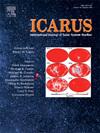Noble gas fractionation predictions for high speed sampling in the upper atmosphere of Venus
IF 3
2区 物理与天体物理
Q2 ASTRONOMY & ASTROPHYSICS
引用次数: 0
Abstract
Venus, our neighboring planet, is an open-air laboratory that can be used to study why Earth and Venus evolved in such different ways and even to better understand exoplanets. Noble gases in planetary atmospheres are tracers of their geophysical evolution, and measuring the elemental and isotopic composition of noble gases in the Venus atmosphere informs us about the origin and evolution of the entire planet. In this work we describe a new mission concept, Venus ATMOSpheric - Sample Return (VATMOS-SR), that would return gas samples from the upper atmosphere of Venus to Earth for scientific analysis. This could be the first sample return mission for an extraterrestrial atmosphere. To ensure it is possible to relate the composition of the sampled gases (acquired when the spacecraft is traveling km/s) to the freestream atmospheric composition, large-scale numerical simulations are employed to model the flow into and through the sampling system. In particular, an emphasis is placed on quantifying noble gas elemental and isotopic fractionation that occurs during the sample acquisition and transfer process, to determine how measured isotopic ratios of noble gases in the sample would compare to the actual isotopic ratios in the Venusian atmosphere. We find that lighter noble gases are depleted after they are sampled compared to the freestream conditions, and heavier ones are enriched, due to the high pressure gradients present in the flowfield. We also observe that lighter noble gases are more affected than heavier ones by changes in the freestream conditions. Finally, we observe that, in general, the numerical parameters do not have a major impact on the observed fractionation. We do, however, note that the freestream velocity and density have a major impact on fractionation, and do need to be precisely known to properly reconstruct the fractionation in the sampling system. We demonstrate that the sample fractionation can be predicted with numerical simulations, and believe that VATMOS-SR, which could be the first mission to bring back samples from another planet, could answer key scientific questions related to understanding the evolution of Venus.
金星上层大气高速采样的稀有气体分馏预测
我们的邻居金星是一个露天实验室,可以用来研究为什么地球和金星的进化方式如此不同,甚至可以更好地了解系外行星。行星大气中的惰性气体是其地球物理演化的示踪剂,测量金星大气中惰性气体的元素和同位素组成可以告诉我们整个行星的起源和演化。在这项工作中,我们描述了一个新的任务概念,金星大气-样本返回(VATMOS-SR),它将从金星高层大气返回气体样本到地球进行科学分析。这可能是第一次对地外大气进行采样返回任务。为了确保有可能将采样气体的成分(当航天器以10公里/秒的速度飞行时获得)与自由流大气成分联系起来,采用大规模数值模拟来模拟进入和通过采样系统的气流。特别是,重点放在量化在样品采集和转移过程中发生的稀有气体元素和同位素分馏,以确定样品中稀有气体的测量同位素比率如何与金星大气中的实际同位素比率进行比较。我们发现,与自由流条件相比,较轻的惰性气体在取样后被耗尽,而较重的惰性气体由于流场中存在高压梯度而被富集。我们还观察到,较轻的惰性气体比较重的惰性气体受自由流条件变化的影响更大。最后,我们观察到,一般来说,数值参数对观察到的分馏没有重大影响。然而,我们确实注意到,自由流的速度和密度对分馏有重大影响,并且确实需要精确地知道以正确地重建采样系统中的分馏。我们证明了样品的分馏可以用数值模拟来预测,并相信VATMOS-SR可能是第一个从另一个行星带回样品的任务,可以回答与理解金星演化相关的关键科学问题。
本文章由计算机程序翻译,如有差异,请以英文原文为准。
求助全文
约1分钟内获得全文
求助全文
来源期刊

Icarus
地学天文-天文与天体物理
CiteScore
6.30
自引率
18.80%
发文量
356
审稿时长
2-4 weeks
期刊介绍:
Icarus is devoted to the publication of original contributions in the field of Solar System studies. Manuscripts reporting the results of new research - observational, experimental, or theoretical - concerning the astronomy, geology, meteorology, physics, chemistry, biology, and other scientific aspects of our Solar System or extrasolar systems are welcome. The journal generally does not publish papers devoted exclusively to the Sun, the Earth, celestial mechanics, meteoritics, or astrophysics. Icarus does not publish papers that provide "improved" versions of Bode''s law, or other numerical relations, without a sound physical basis. Icarus does not publish meeting announcements or general notices. Reviews, historical papers, and manuscripts describing spacecraft instrumentation may be considered, but only with prior approval of the editor. An entire issue of the journal is occasionally devoted to a single subject, usually arising from a conference on the same topic. The language of publication is English. American or British usage is accepted, but not a mixture of these.
 求助内容:
求助内容: 应助结果提醒方式:
应助结果提醒方式:


